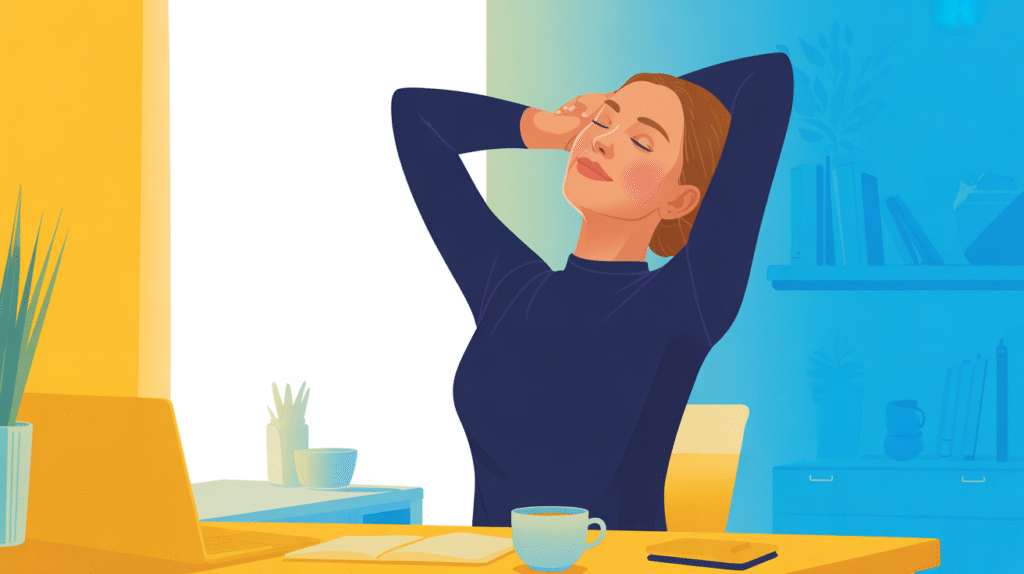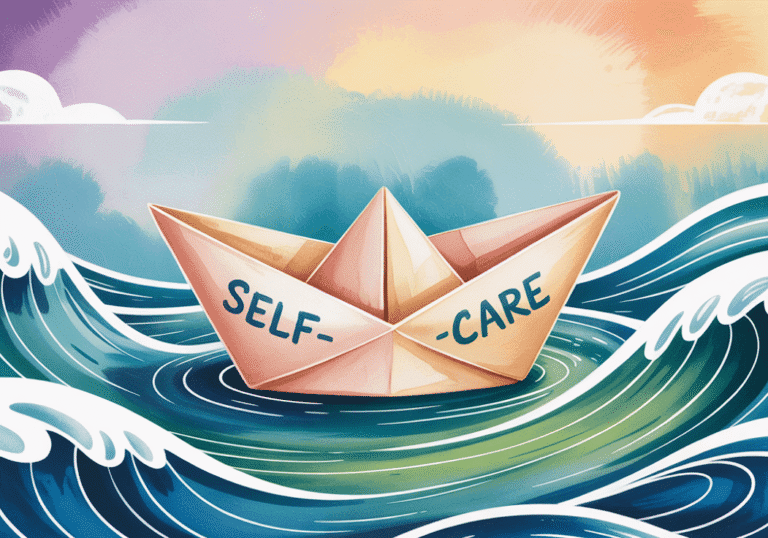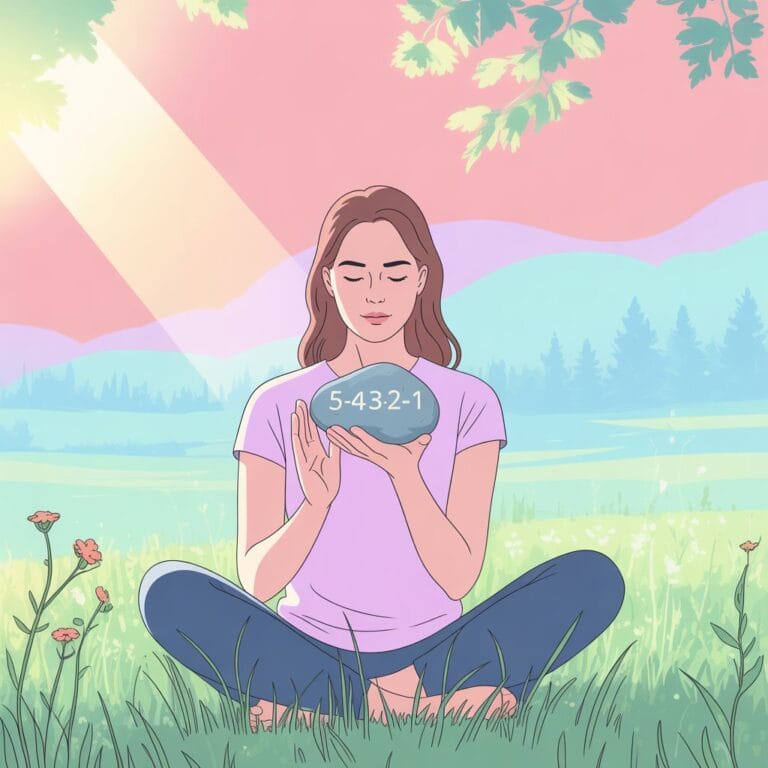You’ve felt it, haven’t you? That nagging guilt when you finally sit down after a long day, only to wonder if you’re being lazy instead of productive. For many women juggling work, family, and quiet worries about anxiety or depression, rest often feels like a luxury you can’t afford. But to boost your rest and productivity, you have to change your mindset.
But here’s the truth: rest isn’t the enemy of productivity; it’s the fuel that makes real growth possible. Common myths paint rest as wasted time, yet science shows it rebuilds focus and sparks creativity. When mental health takes a hit, like during bouts of overwhelm, quality rest helps you recharge and achieve more in the long run.
This post breaks down why prioritizing rest boosts your output and eases daily stress. You’ll learn simple ways to weave it into your routine, bust those myths, and see how it supports life with depression or anxiety. Stick around to discover practical steps that fit your world. For starters, check out this actionable self-care routine for mental health that adds rest without extra pressure.
Table of Contents

How Rest Drives Productivity: Sharpening Focus and Energy
Rest holds a quiet strength that many overlook. It sharpens your mind and lifts your energy, turning everyday tasks into smoother efforts. For women balancing careers, home life, and inner worries, rest clears the fog of fatigue and opens space for better choices. Studies show it can lift focus and performance by up to 40 percent, proving that pauses lead to stronger results over time. Think of rest as the steady base that supports your growth, not a pause in your progress.

How Short Breaks Sharpen Your Focus and Energy
Quick breaks refresh you in ways that keep going strong. A short walk around the block or a few deep breaths can cut fatigue and build vigor, as research confirms. One systematic review of studies found that even brief pauses boost attention and task output, especially when you feel drained.
Picture this: after a full day chasing kids, handling chores, and squeezing in work, your mind feels scattered. Instead of pushing through, step away for five minutes. Women in these roles often face extra layers of demand, and short rests help ease that load. They reduce errors from mental slips and prevent the slow creep toward burnout.
The gains might not hit right away, but they last. Your mood lifts, and attention holds steady longer into the evening. To make it stick, try these simple steps:
- Set a timer on your phone for every 90 minutes of work; it reminds you to pause without guilt.
- Choose active breaks like stretching or a quick chat with a friend; they recharge more than staring at a screen.
- Track how you feel after: note sharper thoughts or less tension to see the real payoff.
Rest like this reassures you it’s a wise move, not laziness. It fuels your ability to solve problems at home or work, building true progress one clear-headed day at a time.

Sleep’s Role in Clearing Your Mind for Better Decisions
Sleep works deep in your brain to wash away the buildup that clouds your thoughts. It flushes out toxins through a system called the glymphatic pathway, as Harvard research explains. This cleanup sharpens memory and sparks fresh ideas, key for handling daily choices.
For women facing anxiety or that constant sense of overwhelm, poor sleep ramps up cortisol, the stress hormone tied to burnout. Studies link solid rest to lower cortisol levels, which guards against exhaustion and foggy decisions. When you skip it, small errors pile up, like forgetting details in a meeting or snapping at family over nothing.
Rest steps in as your ally for clearer thinking. It regulates those hormones, easing the weight of multiple roles and opening room for creativity. Imagine waking from seven hours of sleep ready to tackle a tough talk with your partner or brainstorm at work; that’s the growth rest nurtures.
Prioritize it nightly to see the shift. Aim for a wind-down routine that fits your life, and watch how it turns mental strain into steady strength. Over time, this habit not only prevents burnout but also powers the personal wins that matter most.

Rest for Mental Health: Building Resilience Against Daily Stressors
Rest builds a solid foundation for your mental health. It helps you handle emotions with more ease and strength. When life pulls you in every direction, true rest lowers stress and sharpens your inner calm. This section looks at how rest fights daily pressures and supports women in their unique roles. You gain resilience that lasts, turning rest into a tool for real emotional growth.
Building Resilience Against Daily Stressors
Rest plays a big role in your emotional health. It cuts down anxiety and prevents burnout by giving your mind time to recover. For instance, spending time in nature or picking up a hobby like reading can shift your focus and lift your mood. These moments create a buffer against the rush of daily life.
Studies back this up. Research from UCSF shows that deep rest, through practices like quiet walks or simple crafts, transforms mental well-being. It lowers stress hormones and boosts positive feelings. Another study in PubMed explains how these rests signal safety to your body, leading to better emotional balance.
If you’re a busy mom or professional, small steps make a difference. Start with 10 minutes a day to sit quietly or step outside. These breaks stop overwhelm before it builds. They help you respond to challenges with clear thoughts, not just reactions. Over time, you notice less tension and more steady energy for what matters.
Rest also brings physical benefits that tie to your mind. Vacations or even short getaways lower heart disease risk by easing chronic stress, as data shows. Your body relaxes, and that calm flows to your emotions. Feel the hope in knowing these simple acts build strength you can count on.
Why Women Need Rest to Balance Life’s Demands
Women often carry extra loads from caregiving and career pulls. These demands can drain your energy and spark burnout. Rest steps in to restore balance and improve your overall quality of life. It lets you show up fully for yourself and others.
Research highlights this need. A study in PMC notes that women caregivers face lasting fatigue from these roles. Yet, regular rest reduces that exhaustion and protects health. Another PMC analysis links rest to fewer depressive symptoms over time, especially for women juggling multiple hats.
Rest strengthens your relationships too. When you recharge, you connect with more patience and warmth. It supports self-care, so you avoid resentment from constant giving. Think of it as filling your own cup first; that overflow nourishes your family and work ties.
This practice empowers your growth. It turns pressures into chances to thrive. You handle demands with fresh eyes and less worry. Embrace rest as your right, and watch it fuel the life you build. Small habits like evening unwinds lead to big shifts in joy and strength.

Simple Steps to Make Rest a Part of Your Routine
You know how overwhelming it feels to squeeze everything into your day, especially when mental health adds its own weight. The good news is that rest can fit right in without upending your life. These steps focus on small changes that build over time, tailored for women like you who handle so much. Start with one or two, and soon you’ll notice a lighter load and more space to breathe.
Daily Habits That Fit Your Busy Schedule
Life moves fast, and rest often falls last on the list. Yet simple habits can weave it in, even on your busiest days. Think of them as quick resets that match your rhythm, like a short pause amid family duties or work calls. These practices draw from research on break interventions that lift vigor and ease strain.
Begin with scheduled downtime. Block out 10 minutes twice a day, perhaps after lunch or before dinner prep. Use it to unplug from your phone and sit with a cup of tea. A systematic review shows such breaks improve focus and mood by restoring mental resources, helping you return to tasks with fresh energy. For overwhelmed moms, this might mean closing your eyes while kids nap; it cuts fatigue and boosts patience for the afternoon rush.
Next, tweak your sleep routine for better nights. Aim to dim lights an hour before bed and skip screens to signal wind-down time. Gentle stretches or a warm bath can follow. Studies link these habits to sharper daytime mood and sustained productivity, as they help regulate your body’s clock. If anxiety keeps you up, try a breathing exercise: inhale for four counts, hold for four, exhale for four. This small act calms racing thoughts and leads to deeper rest, so you wake ready for whatever comes.
Incorporate relaxation exercises during transitions. While waiting for the school pickup or a meeting to start, do a quick body scan: tense and release each muscle group from toes to head. This fits women’s packed schedules and counters the drain of constant giving. Research from the American Psychological Association confirms breaks like this enhance well-being and performance, turning scattered moments into chances for renewal. Pick one habit today, and let it grow into a steady ally for your mental health.
Overcoming Guilt About Taking Time for Yourself
Guilt hits hard when you pause, doesn’t it? As a woman, you might feel like rest steals time from family or work, leaving you torn. But that break actually equips you to give more, not less. It rebuilds your strength so you show up with kindness for those around you.
Consider how rest sharpens your presence. When you recharge, you listen better to your kids’ stories or handle a tough day at work without snapping. This isn’t selfish; it’s how you sustain the care you offer daily. Gentle prompts can help reframe it: ask yourself, “What if this rest lets me love them fully tomorrow?” Over time, this shift turns guilt into gratitude for your own needs.
Rest fuels your growth too. It clears mental clutter, so you pursue goals with clearer intent, whether that’s a hobby or career step. For women facing overwhelm or depression, these moments prevent deeper fatigue. Start small: whisper to yourself, “I deserve this pause to be my best self.” You’ll find it opens doors to the progress you crave, one guilt-free breath at a time.
Shifting Mindsets: Letting Go of Guilt and Shame Around Rest
Society pushes you to keep moving, as if stopping means failure. Messages everywhere say busyness equals worth, especially for women who manage homes and jobs. This pressure builds shame around rest, making you doubt its value. Yet recognizing these cultural pulls is the first step to freedom.
Reframe rest as a need, not a flaw. Your body and mind require it to function, much like fuel for a car on a long drive. Without it, you stall; with it, you go farther. This view honors your efforts and protects against burnout.
Use positive self-talk to ease in. Try phrases like, “Rest helps me give my all,” during a quiet moment. Or set a reminder: “This break builds my strength for what matters.” These words foster compassion, turning inner critics into gentle guides. They remind you that self-care strengthens everyone in your circle.
Build connections that support this change. Share your rest goals with a friend over coffee, or join a group for women navigating similar stresses. Talking opens understanding; maybe your sister admits she feels the same pull to hustle. These bonds normalize rest and offer encouragement, so you feel less alone in choosing it. As you let go of shame, rest becomes a shared path to the growth you seek.
Real-Life Stories and Small Wins
Rest changes lives in quiet, powerful ways. You might doubt it at first, especially when overwhelm clouds your days. But real women, just like you, have found that small pauses bring big shifts in energy and peace. These stories show how rest sparks hope and steady progress. They remind us that growth starts with one gentle step.
Stories of Hope from Women Embracing Rest
Sarah, a mom of two and full-time marketer, once pushed through exhaustion until anxiety gripped her chest. She started with 15-minute walks after lunch, away from her desk and kids’ demands. Over weeks, those breaks eased her racing thoughts. She shared how rest helped her finish projects faster, without the fog that once slowed her down. Now, she handles family dinners with real joy, not just duty.
Then there’s Lisa, who battled depression while juggling a nursing job and elder care. Nights blurred into mornings, leaving her drained. She tried evening journaling for 10 minutes, letting worries spill onto paper before bed. This simple rest cleared her mind enough to notice small joys again. Her energy returned, and she even mentored a coworker, finding purpose in the calm she built.
These women echo a larger truth. Many face the pull of constant giving, yet rest offers a way out. For more on how women reclaim health through rest, see how reclaiming health through mindful rest and breaks works. Their paths prove that hope blooms from pauses, turning survival into thriving.
Tips to Spot and Celebrate Your Small Wins
You deserve to see the good that rest brings. Track it to build confidence in this habit. Start with a mood log: jot down how you feel before and after a break. Note if tension eases or focus sharpens. Over days, patterns emerge, like brighter afternoons after a short nap.
Gratitude lists work wonders too. Each night, list three things rest helped, such as a clearer chat with your partner or fewer headaches. This practice shifts your view from what’s missing to what’s growing. It keeps motivation high, even on tough days.
Gentle reflection ties it all together. At week’s end, sit quietly and recall one win, no matter how small. Ask yourself what felt lighter. This builds awareness without pressure. Women navigating burnout often share these tools in stories and tips for navigating burnout experiences. Use them to honor your progress, one restful moment at a time.
Gentle Ways to Prioritize Your Mental Health with Rest
Not all rest has to look like sleeping or doing nothing. Here are some gentle, low-pressure ways to nourish yourself:
- Short breaks between tasks—even two minutes of quiet breathing or stepping outside.
- Naps (yes, even 10–20 minutes) can help reset your energy and mood.
- Mindful breathing, where you simply notice your inhale and exhale, can ground your nervous system.
- Screen downtime: Give your mind a true rest by stepping away from scrolling or notifications.
- Quiet corners at home—a cozy chair, a soft blanket, no expectations.
- Boundaries: Practice saying “no” to plans that exhaust you, and “yes” to moments that restore you.
- When you’re feeling low, choose rest as an act of kindness—not a failure.
Shifting Mindsets: Letting Go of Guilt and Shame Around Rest
Many of us were taught that rest must be earned. But the truth? You don’t have to prove you’re exhausted to deserve care.
Cultural messages often glorify busyness: “Don’t stop,” “Keep grinding,” “Sleep when you’re dead.” But rest isn’t selfish—it’s survival. It’s how you reconnect with your body, your feelings, your sense of self.
Try gently reframing your thoughts:
- Instead of “I’m being lazy,” try “I’m giving my body what it needs to keep going.”
- Instead of “I don’t deserve to rest,” try “Resting helps me show up better—for myself and others.”
Surround yourself with people (or online communities) who support this shift. You’re not weak for needing rest—you’re wise.
FAQs
What does productive rest mean for someone with depression or anxiety?
It means taking breaks that help your nervous system settle—without pressure to “do it right.” Even lying down with your eyes closed counts.
How can I rest when my mind won’t stop racing?
Try grounding techniques like 4-7-8 breathing, listening to calming music, or holding something soft in your hands to help your mind slow.
Is there such a thing as too much rest?
Resting becomes a concern when it turns into isolation or avoidance. But most people are under-rested, not over-rested. Start where you are.
How do I explain my need for more rest to others?
You can say, “I’ve learned that rest helps me stay balanced and healthy. I’m taking care of myself so I can show up better.”
Can resting really help me feel happier in the long run?
Yes. When you’re rested, your brain functions better, your emotions feel more manageable, and you have more energy for what matters.
What are some signs I need to take a break?
Irritability, forgetfulness, emotional numbness, physical fatigue, or losing joy in things you usually enjoy—these can all be signs.

Conclusion
This week, try one small restful change—something simple, like pausing to stretch, turning your phone off for 15 minutes, or going to bed 30 minutes earlier.
You don’t need to earn rest. You deserve it simply because you’re human.
Rest isn’t lazy. It’s productive. It’s powerful. It’s the quiet foundation beneath your growth, your healing, and your hope.
“Almost everything will work again if you unplug it for a few minutes… including you.” — Anne Lamott
You’ve got this. Gently. 💙



